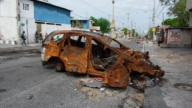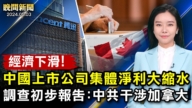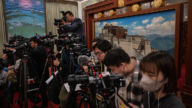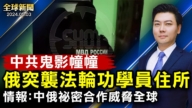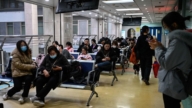【新唐人2011年10月14日讯】缅甸政府从12号开始释放大批囚犯,包括一些著名政治犯。外界普遍认为,这是缅甸进行民主改革的一个步骤。与此同时,世界也把目光投向了中国。对于缅甸政府做出的这一开明举措,是否会成为中共政府的样板,已成为世界关注的焦点,请看本台记者的报导。
缅甸总统颁布大赦令,12号开始释放大约2千名囚犯,其中包括大约70名的政治犯。这次释放的总人数将达到6千多人。这些政治犯是缅甸军政权统治时期入狱的,其中包括许多记者、艺术家、宗教和民主人士。同时被释放的还有曾经对政府持批评态度的喜剧导演扎加纳。
缅甸政府的这一举动,世界各大媒体纷纷报导,也赢得了好多国家和民主人士的赞许。
“中国社会民主党”中央委员会主持人刘因全:“我认为缅甸政府这一举动,这是向好的方向发展的重要一步了,说明缅甸政府有抛弃他们原来的那种专制的那种政体,要开始向民主化来发展。他们释放的这些大部分都是政治犯啊,思想犯啊,这一些.这些人他们被抓被判本身呢?就说明原来缅甸政府实行的是专政制度。现在缅甸政府要把他们释放,这就说明缅甸政府要向民主发展了。 ”
刘因全认为,缅甸虽然迈出了一小步,但对中国也会造成影响。
今年﹙2011年﹚5月12号,人权机构“国际特赦组织”在英国伦敦总部召开新闻发布会,公布2011年世界人权报告。长达400多页的人权报告,涉及157个国家和地区。人权报告有关中国的部分,涵盖言论自由、宗教自由、人权维护者、非法拘禁、刑讯逼供、死刑以及新疆、西藏、香港等内容,对于法轮功在中国遭到的迫害,在人权报告中有专门的陈述。多个案例显示中国的人权在进一步恶化。
《大纪元》新闻网报导,被中共关押的法轮功学员是世界上数量最大的良心犯,联合国受酷刑报告中有2/3案例是法轮功学员。 ”
《法国国际广播电台》报导说,今天缅甸政府决定释放数千名政治犯,那么,关押着王丽蕻、谭作人等无数个良心犯的中国(共)政府今后将何以面对世界?
四川民主人士陈云飞:“我觉得好的东西它就是一个带头的作用嘛,我觉得缅甸应该说是在国际影响上,那么应该是比中国小,那么既然别人都做到那个样子了,我想作为胡锦涛,作为中国(共)政府应该首先出来做好表率,就像我们在学校排队一样,小孩都排队了,那么你大人该不该排队呢? ”
对于缅甸政府的所谓会对中共产生什么影响?陈云飞认为,这件事情是缅甸政府的一个开放性行为,而且是一个良性互动的行为。希望中共它十八大以前,中共对关押的政治犯施行赦免。
不过,中国的很多政治犯在获得释放后,根本没有真正的自由可言。
中国人权观察主席秦永敏,自1982年到2010年曾三次被中共当局以“反革命煽动罪”判刑,最长12年。秦永敏2010年12月回家后,多次受到当地警方的骚扰、威胁,多次被传唤和拘留。
秦永敏:“从缅甸来说,他近来的势头,应该说是比较好的。显然他因为在加速民主进程,而与中国(共)这个专制堡垒拉开距离。 ”
缅甸总统吴登盛自3月执政以来,这是第二次颁布大赦令。去年11月,解除了对全国民主联盟领导人翁山苏姬的软禁。
新唐人记者秦雪、唐睿、薛莉采访报导。
Myanmar Agrees to Release 6,000 Prisoners
The Myanmar regime released a large number of prisoners
on October 12, including some famous political prisoners.
Some regard this is as a step towards democratic reform.
At the same time, the world sets its sights on China.
The Myanmar regime initiated this change but
will it become a model for the Chinese regime, too?
This has become the focus of world attention.
President Wu Dengsheng of Myanmar granted amnesty
to more than 6,000 prisoners, with 2,000 being initially released,
including about 70 political prisoners.
The political prisoners, which included many reporters, artists,
religious leaders and democratic advocates, were sentenced
and jailed by the military regime.
Zhajiana, a comedy director, who had a critical attitude towards
the regime, was also released.
The world’s major Medias have reported
on this new development.
The president’s move has won praises from many nationals
and democratic people.
Liu Yinquan, the Central Committee Chairman
of the China’s Social Democratic Party:
“I think this move of the Myanmar government,
is an important development that is going in the right direction.
It shows that the Myanmar government has abandoned
its original tyrannical ways and has begun to develop
into a democratic nation.
The arrests of political prisoners and prisoners of conscience,
were done by a dictatorial regime.
However, the recent release of prisoners shows that Myanmar
may be developing into a democracy."
Liu said, “Although Myanmar has taken a small step,
China will be affected.”
On May 12, 2011, Amnesty International held a news conference
at its London headquarters to announce the release of its
2011 World Report on Human Rights, consisting of 400-pages,
covering 157 countries and regions.
Regarding China, it covers freedom of speech, religious freedom,
human rights defenders, illegal detention, torture, the death penalty
and contents about Xinjiang, Tibet, Hong Kong, etc.
With regards to the persecution of Falun Gong in China,
the report has made specific recommendations.
In many cases, the report shows that China’s human rights
have eroded to a new low.
The Epoch Times reported that Falun Gong practitioners
who were detained by the Chinese Communist Party (CCP),
represent the world’s largest number of prisoners of conscience.
In a United Nations report on torture, two out of three cases
involved Falun Gong practitioners."
Radio France Internationale noted that the Myanmar regime
decided to release thousands of political prisoners,
but asked, “How could China (CCP) face the world
when they still detain countless prisoners of conscience,
including Wang Lihong and Tan Zuoren?”
Chen Yunfei, a Sichuan Democrat:
“I think doing the right thing will become the new norm.
Myanmar has a smaller international impact than China,
but if others have done the right thing, so can President Hu Jintao,
and the Chinese government (CCP).
They should first set a good example.
Like we line up in school, the children are lined up,
then shouldn’t the adults line up, too?"
How can the Myanmar regime’s positive behavior affect the CCP?
Chen believes that this shows Burma’s openness
and could act as a catalyst to other countries.
Before the 18th National People’s Congress,
the CCP could release political prisoners.
Many political prisoners released in China had no real freedom.
President Qin Yongmin of China Human Rights Watch
was sentenced three times from 1982 to 2010 by Chinese
authorities for ‘counter-revolutionary incitement.’
The longest sentence he received was 12 years.
Qin Yongmin was sent back home in December 2010,
but was harassed, threatened, and summoned
by the local police many times.
Qin Yongmin: “For Burma, and its new political direction,
we can say it is quite good because it has accelerated
the democratic process, which sets it apart
from the CCP’s authoritarian regime."
President Wu Dengsheng of Myanmar, who came to power in March,
had previously granted amnesty.
Last November, he lifted the house arrest order
of Aung San Suu Kyi, the leader of National League for Democracy.
NTD reporters Qin Xue, Tang Rui and Xue Li


